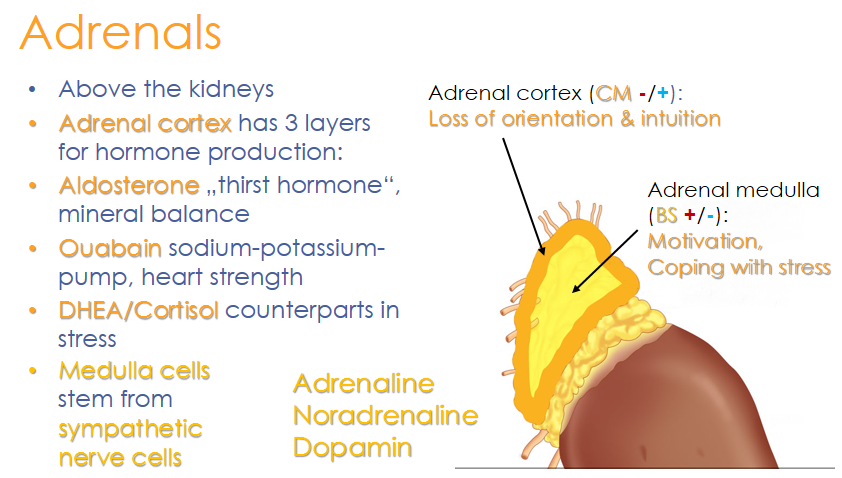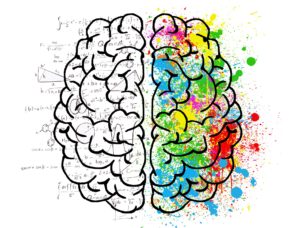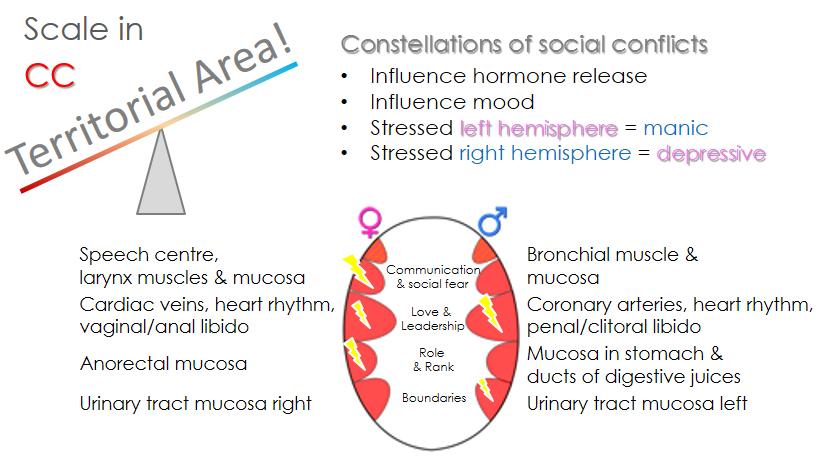
Yes I do. I knew depression and could have died from it some 30 years ago. I’m still aware of how I can feel off balance and feeling down. What I don’t fear anymore is that black hole. I’ll tell you what I learned – but first let’s look at causal factors:
Depression represents an imbalance in the brain and with hormones. The feeling of paralysis in utter powerlessness and despair shows that what gives us activity and decisiveness is at a lack – and these are adrenal hormones like dopamine, noradrenaline, cortisol, and sex steroids.
What is it that shuts down their release?
In natural surroundings, you’d observe a recession into passiveness and sleep
- at night
- in winter times
- in reconvalescense
AND
- when “playing dead” to survive!
All these states are led by the parasympathetic nervous system.
The Autonomic Nervous System (ANS) is about rhythm. As long as there is counterbalance, a new morning, a pulsing earth, a glimpse of hope, we’re fine. Did you ever long for darkness?
I have lived in a northern country, where in summer, the sun hardly went down at all. When I had guests, they usually tried to darken their sleeping rooms, and did not like the crow of the rooster at 4 or 5am. They expected to be left in peace.
- Before the onset of a depression, what might have caused you too much strain, too much stress – so that the ANS pulled a brake to give you some darkness?
- Or is the state itself a hiding place, keeping a threat at bay that would otherwise need you to engage?
Typically, you may have experienced a loss of authenticity and orientation in life. What happens then is that your adrenals will lower their release of motivational and energetic hormones, in order to stop you in your tracks and enable a period of time to find the way back to yourself and to the path that feels right!
If you are a coffee addict in the mornings or throughout the day to get you going, you are cheating your system.
Is it that you lost your playfulness and enthusiasm, your song and dance somewhere on the way?

Who can save the world?
When I was on my first job training and far from home, I had my first severe bouts of depression. I was looking for my place and goal in the world, had some inspiration and a lot of struggle with tradition, was very idealistic, anti-mainstream and black-and-white like many teenagers feel, and being serious about my ideas was my character much like it is for Greta Thunberg these days. Would she be depressive if she didn’t make her way from Sweden to Davos to change the world?
Enthusiasm for a real solution was what in an instant catapulted me out of depression!
By chance I had found a place to live and challenge my convictions, a place that would test my worthiness to live the sustainable life I dreamed of. I fought to do my share, to be a responsible member of a farm working like in the Middle Ages. And it almost broke me. It certainly dissolved my delusions about good and bad, right and wrong. Instead, I got my drivers for basic survival back. It’s the close contact to nature that does it!
There is no room for depression as a constant state of suffering in nature.
Nature requires presence.
However, the story was not over yet. Having admitted defeat I left the place to go “home”, and the manic and depressive phases returned. I felt the life, but also the restlessness of missing inner peace. I had to move, to run and to search, and could be aggressive or unconsolably sad. I still hadn’t found my authentic self. While growing up once again and going through all these stages, I suffered and so did my environment.
It was a spiritual revelation that saved me this time. In the middle of the Black Hole where I felt suspended, all alone with no bottom to reach, I suddenly gained awareness. There was my “angel”, my little playful wise avatar, and he laughed at me. I began to laugh and I couldn’t stop. All the hopelessness and loneliness dissolved and was shaken out of my system. Here I was, and I was ok. There was sound and motion. It had always been there. I had reconnected with my being!
Inner doubts and polarity want to be embraced and transcended.
Lessons to be learned
 Nowadays, I use an Inner Peace Process which balances and coordinates the brain hemispheres, which also represent polar qualities and functions, to help resolve the inner conflict that triggers depressive and manic states.
Nowadays, I use an Inner Peace Process which balances and coordinates the brain hemispheres, which also represent polar qualities and functions, to help resolve the inner conflict that triggers depressive and manic states.
This is reflected in the concept of Cerebral Cortex Constellations we explore in META-Health, that mainly show in psychological and mental responses and characteristics of our personality, but also can be triggering specific physical symptoms which lead us to the themes at the root cause:
- People who’s depression is coupled with anxiety and social fear will often suffer from hypothyroidism, chronic coughing, or asthma. Key experiences in their past were to do with powerlessness, speechlessness and fear of losing their place and belongings.
- Those who have suicidal thoughts may show high cholesterol and a tendency for coronary infarctions, or afflictions in their sexual organs – at the root will be sexual trauma, or having lost all that mattered to them in life.
- When you observe suppressed aggression or self-harming behaviour, these persons felt they weren’t granted their rightful place and a function in society. More often than not, they may suffer from stomach ulcers, gallstones, indigestion or incontinence.
These constellations are archetypes that are better to be transformed and their energy used in a more constructive way, than completely resolved:
A person can let go of anxiety but they will keep respect and a soft spot for responsibility, which is a good thing.
Somebody who has gone beyond fear and played with taking his life, will find the power to support a cause that gives him the direction he needs.
Just like in Traditional Chinese Medicine, aggression is not a bad thing per se: the energy gives you courage to challenge and reform – the way you do it can be of a “peaceful warrior”.
Constellations can add magic and spice to our human societies…
How many great artists have been bipolar?

Regeneration after stressful episodes comes with depression
Depressive episodes often begin after a major change in our life, especially when our biological function in society is changing. Think of depression after giving birth, or in menopause: a previous stressor and driver has disappeared, now we need to accept or define our new role.1
Doctors and scientists also found that depression is often coupled to chronic inflammation2 and have hypothized that not only would the pain of inflamed tissues lead to feelings of helplessness and grief, but that the very transmitter substances that induce inflammation in the body, also induce depressive states.3
This is not so far-fetched:
Actually, each time you lie down with fever and infection of some sort, you are in a deep parasympathetic state, meaning that you are not meant to be active but to take care and be taken care of in order to recover!
When you experience this over and over again like in chronic or autoimmune diseases, your system hardly ever gets into inner peace or balance but is struggling with conflictive thoughts, emotions and environmental triggers. It is being being thrown in and out of amplified stress and recovery, and being sensitized for various expected threats.4
Clearing the picture by turning around, by being present, and by finding a purpose and a goal to follow, will bio-logically reduce the inflammation response.
Breathwork can efficiently help with that.5 6 7
Forgiveness or healthy aggression?
As in any archetypical story, the hero has to fight before there can be a happy ending. When you process your conflicts, don’t suppress your “dark side” and your depth, your anger, aggression and self-doubt. It makes you wiser and more humane to face them, be aware of them, embrace them, and being able to use them. This is what you can facilitate by tapping and by mindfulness.
Forgiveness has no meaning without self-respect!
To overcome the blues, you need to feel and support decisiveness and energy in your system, you need the “male” side to dance with the “female”. It is the bold prince who goes through the hedge of thorns and revives the Sleeping Beauty.
Any kind of motion is helpful in depressive states8, especially purposeful voluntary motion, however small to begin with9. You can support it with your posture, with yoga, fresh air, light, Vitamin D10 11 12, tryptophan13 and appropriate food with natural carbohydrates, proteins and fats to supply energy (Interestingly, both a plant-based diet and read meat14 have shown benefits against depression). To voluntarily tap into the ANS and endocrine system, enabling a special route by a combination of breathwork, focusing and cold exposure has been proven effective15…
But this will be explored in another article!
Learn to decode the individual root causes, triggers and therapy options for depression: study META-Health!
References:
[1] https://www.ncbi.nlm.nih.gov/pmc/articles/PMC2440795/ (female hormones)
[2] https://www.ncbi.nlm.nih.gov/pmc/articles/PMC3285451/ (inflammation)
[3] https://www.ncbi.nlm.nih.gov/pubmed/29153615 (pathways, tryptophan)
[4] https://www.ncbi.nlm.nih.gov/pmc/articles/PMC5542678/ (social triggers)
[5] https://link.springer.com/article/10.1007/s10879-011-9180-6 (breathwork)
[6] https://www.sciencedirect.com/science/article/abs/pii/S0005796705002743 (breathwork)
[7] https://www.ncbi.nlm.nih.gov/pmc/articles/PMC5072593/ (breathwork)
[8] https://www.cochrane.org/CD004366/DEPRESSN_exercise-for-depression (exercise)
[9] https://ki.se/forskning/motion-mot-depression (exercise)
[10] https://www.ncbi.nlm.nih.gov/pubmed/29943744 (Vit D)
[11] https://www.ncbi.nlm.nih.gov/pmc/articles/PMC2908269/ (Vit D)
[12] edoc.sub.uni-hamburg.de/haw/volltexte/2015/3140/pdf/Sarah_Lankenau_BA.pdf (Vit D)
[13] https://www.ncbi.nlm.nih.gov/pmc/articles/PMC4393508/ (tryptophan)
[14] https://kellybroganmd.com/red-meat-for-your-depression/ (nutrition)
[15] https://www.ncbi.nlm.nih.gov/pubmed/24799686 (WHM ANS)
pictures: https://pixabay.com/photos/fantasy-light-mood-sky-beautiful-2861107/
MHI (author: Kora Klapp)
https://pixabay.com/illustrations/brain-mind-psychology-idea-drawing-2062057/
 META-Healthy Life articles are created by professionals and friends of META-Health International CIC, supporting individual and global health by deepening and sharing our understanding of how resilience and well-being are achieved.
META-Healthy Life articles are created by professionals and friends of META-Health International CIC, supporting individual and global health by deepening and sharing our understanding of how resilience and well-being are achieved.